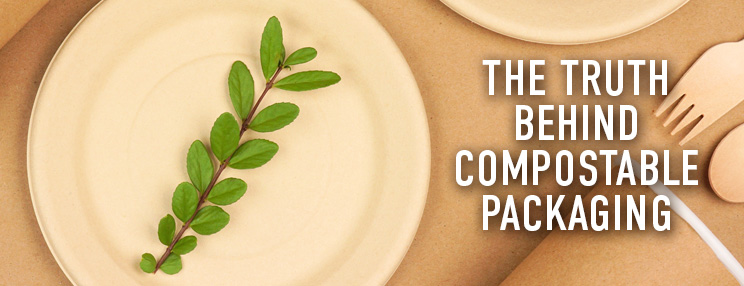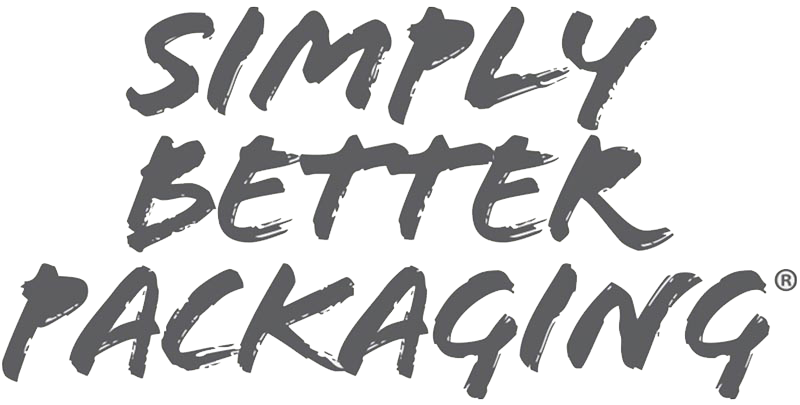The Truth Behind Compostable Packaging

As sustainability is growing in importance to consumers, compostable plastic packaging has gained popularity in recent years. This compostable packaging is made with bio-based materials, having the ability to break down and create nutrient-rich soil [1]. Compostable packaging does have its benefits: just like with recycling, it can decrease the waste that ends up in landfills; when it decomposes it can create nutrient-rich soils, and it has the potential to reduce greenhouse gas emissions [1]. Though there are benefits, there are also downfalls with compostable packaging:
- Land and Resource Use: To grow enough crops to keep up with the demand, there would be increased competition for land, which could mean that there would be less land available for food growth along with possibly destroying natural ecosystems [2]. This would also lead to a decrease in biodiversity as more land would go towards growing one type of crop versus many [2]. Monocropping is known to negatively impact the environment, and using compostable packaging could increase this harmful practice [3].
- Lack of composting facilities: Unlike food waste, much compostable packaging cannot decompose in backyard composting piles [4]. They need to be taken to a specific facility to decompose, and only a few cities have these facilities [4]. As a result, compostable packaging ends up in landfills to decompose, where it releases methane, an incredibly potent greenhouse gas [5].
- Chemical Additives: A lot of compostable packaging contains chemicals and additives to make them durable enough for use, containing similar chemicals to conventional plastics [6]. Two in particular that experts are concerned about are per-and poly-fluoroalkyl substances, also known as PFAS, which are linked to serious health problems [6]. Not only do these substances leak into our food, but also into other compost when they are thrown in the same bin [6].
- Greenhouse Gas Emissions: Though they are often marketed as environmentally friendly, compostable packaging tends to have higher greenhouse gas emissions because of the agricultural portion of production [5]. As stated previously, they also release methane when not disposed of properly [5].
- Single Use: When it comes down to it, whether the item is composted properly or ends up in a landfill, it is still single use. None of the material that was that item will be found in another item, which means the new product will be made with 100% virgin material, indicating that more resources will be needed [7].
While compostable packaging on paper seems like the answer to our pollution problem, it may not be the answer we are looking for. Recycling often gets a lot of hate due to low recycling rates, but when it is done properly, it can be incredibly beneficial to reducing plastic waste in landfills. With recycling, material from one item will show up in another, reducing the need for virgin material along with diverting waste from landfills [8]. By reducing the need for new resources, recycling helps conserve energy and any wasteful byproducts that come from production [9].
Though recycling does have its downfalls, in terms of reducing resource depletion and diverting waste from landfills, it is the best solution we have.
[1] Composting versus Recycling: Differences and Benefits (goodstartpackaging.com)
[2] report-throwing-away-the-future-false-solutions-plastic-pollution-2019.pdf (greenpeace.org)
[3] The Dangers of Monocropping – Local Agriculture – Ashfount Investments
[4] Why compostables and bioplastics aren’t the answer — Upstream (upstreamsolutions.org)
[5] TalkingTrash_Bioplastics.pdf (talking-trash.com)
[7] Is compostable packaging actually sustainable? – sarah bassett
[8] Why Is Recycling Important? (20 Benefits of Recycling) (enlightio.com)
[9] Recycling in the United States | US EPA
ABOUT PLACON
Since 1966, Placon has been a leading designer and manufacturer of innovative and sustainable plastic packaging for medical, food, and consumer goods markets. Placon has manufacturing operations in Madison, WI; West Springfield, MA; Elkhart, IN; and Plymouth, MN, and is currently ranked in the Top 20 in Plastics News 2024 Thermoformers Rankings. Placon delivers packaging breakthroughs that inspire better engagement between people and products.





